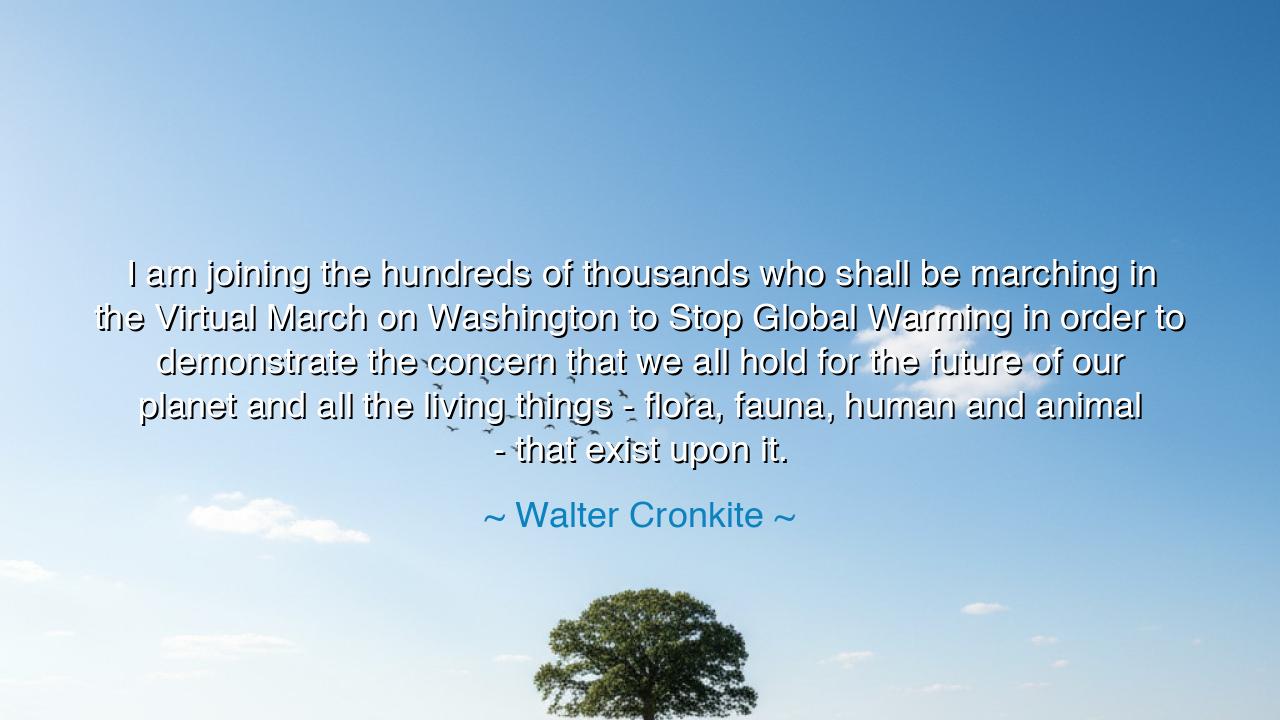
I am joining the hundreds of thousands who shall be marching in
I am joining the hundreds of thousands who shall be marching in the Virtual March on Washington to Stop Global Warming in order to demonstrate the concern that we all hold for the future of our planet and all the living things - flora, fauna, human and animal - that exist upon it.






In the great story of human history, there are moments when the fate of the world rests not in the hands of a single ruler or leader, but in the collective action of the people—united by a common cause and bound by a shared understanding of the importance of the moment. Walter Cronkite, in his declaration, "I am joining the hundreds of thousands who shall be marching in the Virtual March on Washington to Stop Global Warming in order to demonstrate the concern that we all hold for the future of our planet and all the living things—flora, fauna, human and animal—that exist upon it," speaks to a pivotal moment in which the consciousness of the world is awakening, calling for action to preserve the very essence of life itself. His words are a rallying cry, a powerful reminder that we, as individuals, are connected to a much larger whole—the planet, and everything that lives upon it.
The ancients understood the interconnectedness of life. In ancient Greece, the philosophers and poets often spoke of the sacred relationship between humanity and nature. Heraclitus, the philosopher, spoke of the unity of opposites in the world, where all things are interdependent. In his teachings, he suggested that everything in nature, from the earth to the stars, was in a state of constant change, yet all were bound by a profound order and harmony. This understanding of nature as a living, breathing entity that reflects the interdependence of all things is echoed in Cronkite’s call to action. Just as the ancients understood that the destruction of one part of the world affected the whole, so too must we realize that the harm caused by global warming threatens the balance of the entire planet.
Similarly, the Romans, under the leadership of Cicero, recognized that the health of a state was tied to the well-being of its people and the land upon which they lived. Cicero’s reflections on the Republic emphasized that true prosperity could not exist in a society that neglected its moral duties, including the care of the land and environment. He understood that the very essence of the Roman empire was tied not only to its military might but to the health and sustainability of its foundations. Cronkite’s call for action against global warming mirrors Cicero’s idea that humanity must live in harmony with the land, understanding that the future of our civilization is intertwined with the health of the natural world.
Throughout history, the most profound changes often came when individuals and societies were able to rise above their immediate concerns and recognize the broader future at stake. Consider the example of Mahatma Gandhi, who led a movement that sought not just independence for India, but the moral and spiritual liberation of its people. Gandhi’s non-violent march to the sea to protest British salt taxes is one of the greatest symbols of collective action for a cause greater than the self. Just as Gandhi’s cause was a fight for justice and freedom, Cronkite’s call is a battle for the preservation of life and the planet for future generations—to ensure that our children, and their children, will inherit a world that is capable of sustaining life, not one ravaged by climate change and environmental destruction.
The lesson of Cronkite’s words, as well as the teachings of the ancients, is clear: the fight to protect our planet is a fight for the future of all life, and it is a moral duty that each of us shares. Whether it is through individual actions—such as reducing waste, conserving energy, or supporting sustainable practices—or through collective efforts, such as participating in marches, advocating for policy changes, or supporting organizations that fight for the planet, we are all called to take responsibility for the world we leave behind. This fight is not simply about nature; it is about our humanity and our shared future.
In practical terms, we must begin by recognizing that the future of the earth lies in our hands. This means living with greater awareness of the impact of our actions, both individually and as a society. Just as Cicero believed that a healthy state was rooted in moral responsibility, we must take up the mantle of environmental responsibility—not as a passing trend, but as a foundational principle for the sustainability of future generations. We must advocate for renewable energy, sustainable agriculture, and the conservation of the natural world. We must teach our children and future generations to respect and care for the environment, understanding that our actions today will either heal or destroy the planet they will inherit.
The road ahead is fraught with challenges, but it is also filled with hope. Just as the ancients believed that wisdom and courage could shape the course of history, so too can we. The lesson from Cronkite’s words is that every individual has a part to play in the future of our planet. Let us be agents of change, working together to ensure that the world we pass on is one that is not defined by destruction and decay, but by growth, hope, and sustainability. Let us march together, not just in virtual spaces, but in our everyday actions, to protect and preserve the world for all the living things—flora, fauna, human, and animal—that share it with us.






AAdministratorAdministrator
Welcome, honored guests. Please leave a comment, we will respond soon